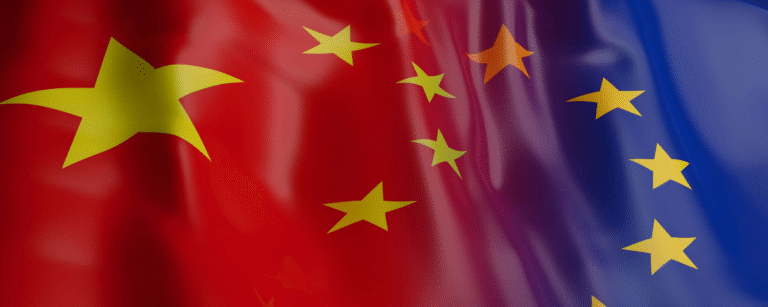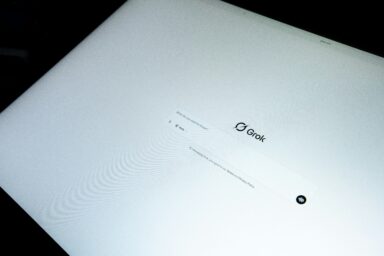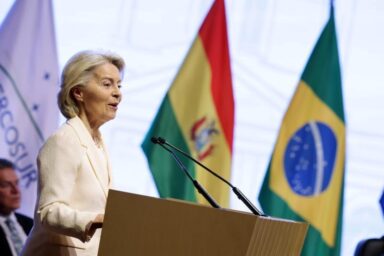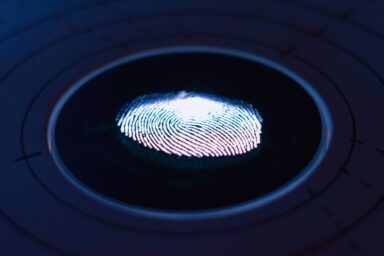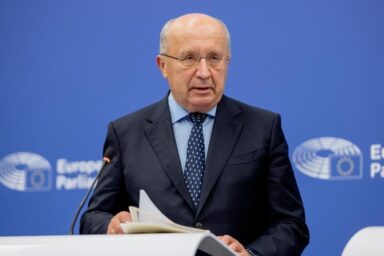As the EU prepares for its long-awaited EU-China summit later this month, tensions are mounting over Beijing’s export restrictions on rare earths. In April, China imposed a ban on six rare earth elements, causing turmoil in Europe’s industrial sector.
Deng Xiaoping, the former Chinese leader oft-dubbed ‘the architect of modern China’, put it plainly back in the 1980s: “The Middle East has oil. China has rare earths.” His government then set out to mine and refine this group of critical minerals, not least for their strategic value.
That strategic interest is now more relevant than ever, and it has caused turmoil in the EU. For decades, China sold rare earths below cost to drive out competitors, refined the extraction process, and built vast state-backed industrial capacity. Today, the EU depends on China for 98 per cent of its rare earth magnets, 94% of gallium, and 83% of germanium, two minerals crucial to semiconductors used in controlling electricity and light in electronic devices.
While some of those rare earths are not necessarily scarce, their processing is complex and often highly polluting. Many countries thus outsourced much of this work to China, which now handles 90 per cent of global refining. As all the processors enjoy the perks of state ownership and do not necessarily need to make a profit, China has a huge competitive advantage.
You might be interested
Car industry suffers
So far, the export restrictions have hit the European car industry the hardest. Modern cars are full of rare-earths magnets, for example windshield wipers windows, brakes and steering systems.
Following the April ban, several production lines have halted operation, the European Association of Automotive Suppliers (CLEPA) said. Suzuki Motors even temporarily suspended production of its Swift models in Hungary.
In early June, EU Trade Commissioner Maroš Šefčovič met with Chinese Commerce Minister Wang Wentao during an OECD gathering. “I informed my Chinese counterpart about the alarming situation in the EU car industry,” Mr Šefčovič said. “Rare earths and permanent magnets are essential for industrial production , this is extremely disruptive.” Mr Wang said China was open to accelerating export licenses for EU companies.
Following those conversations, China approved some export licenses, and the backlog is slowly easing. But CLEPA warned last week that 25 per cent of applications are still pending, and further disruptions could hit this summer. “The European car industry remains dangerously exposed to Beijing’s grip on strategic resources,” CLEPA stated.
While Europe scrambles to secure materials, Chinese car brands are gaining ground. In May alone, 65,808 Chinese cars were sold across Europe, more than double the figure from May 2024. Chinese automakers were the main driver of growth in the European electric vehicles (EV) market that month.
Defence feels the heat
And the impact goes far beyond cars. The defense sector is feeling the heat. In that regard, halted export of samarium is a key concern. As it is more heat-resistant than other rare earth metals, samarium features in missiles and fighter jets, such as the F-35, widely used by many European armies. Each F-35 contains 25 kilograms of this metal, and China owns 100 per cent of available samarium.
During last week’s debate on EU-China relations in Strasbourg, MEPs noted that the export restrictions are also a matter of defence, especially with regard to Ukraine. Bart Groothuis (Renew/NLD) said: “Remember, no guided missile can be produced without gallium,” the export of which China also restricted. Markéta Gregorová (Greens-EFA/CZE) echoed that remark, noting “our strategic interest is Ukraine, not German cars.”
That the defense sector is feeling the pain is no coincidence. At the heart of the rare earth dispute lies China’s increasing reluctance to supply materials that could indirectly benefit American military contractors. Exporters now need licenses certifying that their products won’t end up in US defense supply chains, an almost impossible promise in today’s globalized economy.
Restrictions as leverage
The restrictions primarily target the US, and the hit to EU industry is a side-effect of sorts. However, it would be naive to see China’s actions against Europe as purely collateral damage. China wants access to advanced chipmaking machines from Dutch tech firm ASML, now blocked from export to China under US pressure. The export restrictions can thus serve Beijing as key leverage to regain access to the machines.
At the same time, tariffs on Chinese EVs are another source of tension. Last year, Brussels launched an anti-subsidy probe and recently imposed provisional duties of up to 38.1 per cent on Chinese EV imports.
In Paris last month, Chinese Minister Wang suggested talks on a minimum price for Chinese EVs had made “substantial progress”. Beijing now says negotiations are in their final phase.
De-risking
Jens Eskelund, president of the EU Chamber of Commerce in China, said both corporate and diplomatic pressure to resolve the bottleneck is growing. “For all those who have been calling for de-risking, this proves the point,” he said.
De-risking was also central to Commission President Ursula von der Leyen’s address to the European Parliament this week. Ms von der Leyen called the EU-China relationship “one of the most defining of the 21st century.” Trade between the two powers amounts to €2bn per day, twice the volume of EU trade with Switzerland. But the imbalance is stark: China’s trade surplus with the EU hit a record €300bn last year.
“Our companies face systemic discrimination in China,” Ms von der Leyen said. “Public procurement is skewed. Access to sectors like medical devices is restricted. And overcapacity is being dumped onto global markets, first solar panels, now EVs.”
In response, the EU is pursuing three priorities in the summit, the Commission President said. She listed rebalancing the economic relationship by demanding reciprocity and transparency; de-risking supply chains by diversifying critical imports, turning to countries like Vietnam, Brazil, and India (though many lack China’s refining capacity); and advancing global diplomacy, particularly in climate policy, where China remains a vital, if complicated, partner.
Will the beast eat the EU last?
But the question is if the EU even has the power to make those demands. In that regard, MEP Groothuis underlined the “strategic chokehold” China has over Europe and urged the Commission to not just go to China with big words, but real leverage: “It’s about showing who has the power,” he said. “Striking a deal? Feeding the beast won’t pacify it. Use the EU’s economic leverage. Use every tool, close the market if necessary, impose export controls, sanction Chinese banks fueling Moscow’s aggression.”
Ms Gregorová reinforced this stance: “ The EU-China summit is a test of the union’s credibility.” “It’s time we behave like an equal partner. We allow (China) to flood our markets, and to block our companies from entering its market.”
According to MEP Marion Marchelas (ECR/FRA), the Commission is still taking the wrong course by its continued focus on climate policy: “China is taking advantage of the rare earth sector dominance. And you have this plan to reduce CO2 emissions. You’re fighting fossil fuels, but what we need is a trade policy based on interests of member states. The greatest continent is soon going to be reduced to property.”
Diversifying supply
Meanwhile, the EU is trying to decrease its dependence on China by diversifying its supply base. Recently, the European Commission announced investments in rare earth mining in Malawi and South Africa. In Serbia, a lithium mine operated by Rio Tinto is now under consideration for EU support under the Critical Raw Materials Act (CRMA), a law designed to reduce dependency on China.
Eyes are also turning to Brazil. The country holds an estimated 21 million tons of rare earths, second only to China. And that is based on a survey of just 30 per cent of its territory. Its soil is particularly rich in dysprosium and terbium, key for heat-resistant magnets used in EVs.
But these alternatives do not come without challenges. In Serbia, the lithium push has triggered political controversy and environmental protests, damaging relations with Brussels and complicating the country’s EU accession hopes. On top of that, diversifying access to these crucial resources is a long-term endeavour.
For now, Europe’s dependence on China remains.
As the EU-China summit approaches, President Xi Jinping’s attendance is uncertain. Bloomberg reported China may reduce the summit to a single day, although neither the European Commission nor China’s Ministry of Foreign Affairs has confirmed this.
This raises real questions about what arguments EC President von der Leyen and Council President António Costa can bring to the table on 24 July, and how much room they will have to manoeuver.
